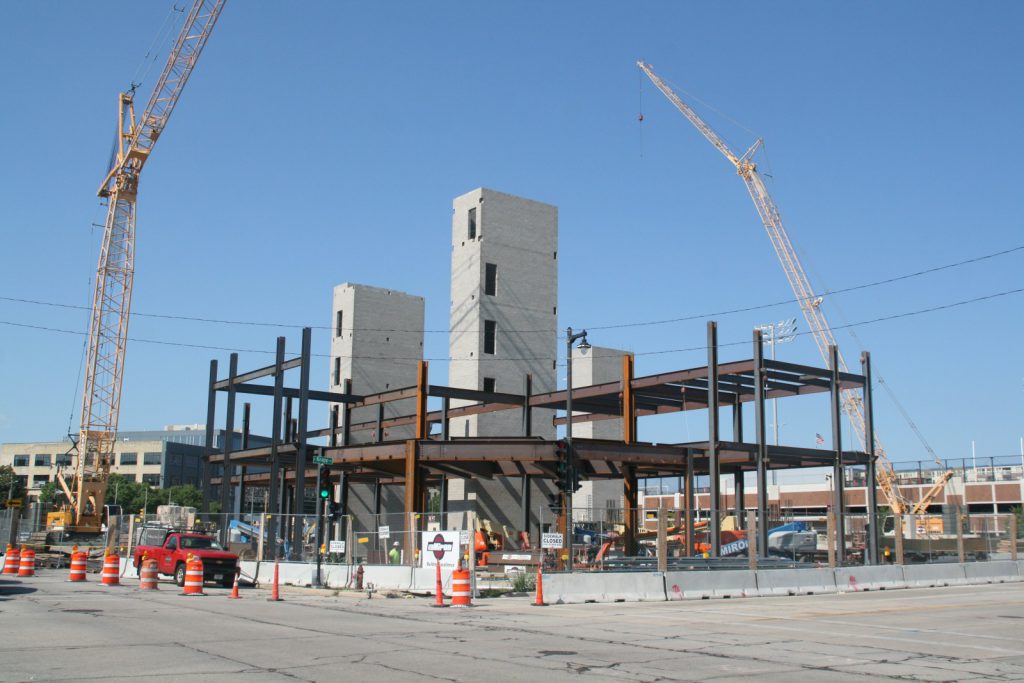Construction Industry Has Huge Capitol Clout
$11 million political in donations helps get policies to reduce safety measures in buildings.
This construction industry lobbying group has long been viewed as one of the most powerful special interest influences on policymaking and spending at the State Capitol – once even dubbed one of the Four Horsemen of the Apocalypse.
About 15 years ago, the builders association was among four powerful special interest organizations referred to as the “four horsemen” – a Biblical reference that signals the end of the world – in a 2002 criminal complaint against former Republican Assembly Speaker Scott Jensen. The complaint arose from the Caucus Scandal investigation into state employees and resources being used on legislative campaigns. The probe led to charges, convictions and jail time for some Democratic and Republican legislative leaders. No groups were charged in the investigation. The other three horsemen were Wisconsin Manufacturers & Commerce (WMC), Wisconsin Farm Bureau Federation, and the Wisconsin Realtors Association.
In addition to its lobbying clout, the construction industry has doled out nearly $11 million in 10 years in special interest campaign contributions to Wisconsin legislative and statewide candidates.
For instance, the group surfaced in media accounts last month about the state deciding to no longer enforce a 2010 state agency rule that requires fire-prevention sprinkler systems in apartment buildings with between three and 20 units. The group had opposed the seven-year-old rule. The Walker administration decided to stop enforcing the sprinkler requirements in July after a Department of Safety and Professional Services lawyer deemed it illegal because a state law passed in 2011 forbids state agencies from developing state rules that are stricter than state statutes, and no state law specifically required sprinklers for apartment buildings with 20 units or less. The builders group was among a band of powerful special interests that supported the 2011 law restricting state agency rules involving public health, safety, construction, agriculture, environmental, and consumer protection, among other things.
And earlier this year, the builders group opposed stricter electrical code changes in new homes to prevent fires and shocks. The Walker administration initially backed off on the tougher proposals and even considered loosening the standards until it was widely reported and criticized by firefighters. To date, no changes have been made.
During the past 10 years through December 2016, the construction industry doled out $10.9 million in individual and political action committee (PAC) contributions to state candidates. The top recipients of construction industry campaign contributions were:
Republican Gov. Scott Walker, just over $6 million
Former Democratic gubernatorial candidate Tom Barrett, about $375,380
Former Democratic Gov. Jim Doyle, $325,410
GOP Lt. Gov. Rebecca Kleefisch, about $320,435
Republican Assembly Campaign Committee, about $219,100
About $713,500 of the $10.9 million in total contributions from the construction industry came through a PAC and a conduit operated by the builders association. About $653,000, or 92 percent of those contributions, went to Republican legislative and statewide candidates.
In addition to campaign contributions, the group has spent nearly $1.5 million since 2007 on lobbying dozens of tax, zoning, land use, labor, environmental and construction-related legislative proposals. And its spending has paid off: Nearly six dozen bills back by the builders association have become law, mostly since 2011 when Walker and GOP legislators gained control of state government.
So far this legislative session, a measure backed by the group was signed into law that restricts state agencies from making rules and regulations that cost a business or industry more than $10 million without legislative approval. The law would also allow legislative leaders to file permanent objections to a proposed rule to effectively kill it.
In recent years, the builders association also supported the following laws:
2013 Act 1 – Loosens several state environmental safeguards for mining.
2011 Act 118 – Removes some wetlands protections and makes it easier for certain wetlands to be polluted.
2015 Act 391 – Severely restricts the ability of local government to regulate the repair, remodeling or replacement of structures located on privately-owned shoreland.
2013 Act 154 – Restricts the legal options available to victims of asbestos-related injuries who seek compensation from companies that used asbestos.
2011 Act 2 – Limits damages awarded in lawsuits against nursing homes, manufacturers, and retailers.
2015 Act 126 – Creates a $7 million a year tax break for materials used in nonprofit or local government construction projects.
2011 Act 219 – Eliminates compensatory and punitive damages for racial, sexual and other acts of employment discrimination or genetic testing.
2011 Act 10 – Severely restricts public employee collective bargaining rights.
2011 Act 219 – Limits options for women to sue to enforce equal pay provisions.
2011 Act 170 – Prohibits local governments from enacting shoreland zoning rules that are stricter than state law.
2011 Act 144 – Creates requirements that local communities must meet to impose development moratoriums and limits moratoriums to one year plus a six-month extension if necessary.
Campaign Cash
-
Outside Groups Spent Record $28.8 Million on State Supreme Court Race
 May 7th, 2023 by Erik Gunn
May 7th, 2023 by Erik Gunn
-
Top 20 Donors to State Political Parties
 Apr 4th, 2023 by Peter Cameron and Hina Suzuki
Apr 4th, 2023 by Peter Cameron and Hina Suzuki
-
$38 Million Spent on High Court Race
 Mar 29th, 2023 by Erik Gunn
Mar 29th, 2023 by Erik Gunn





















